Khamenei Book Unveiled In Venezuela To Spread Influence
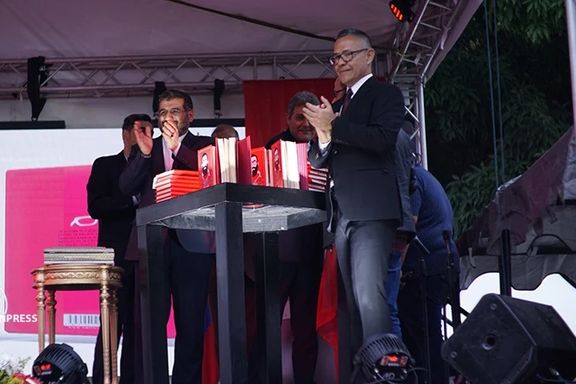
In order to expand the Islamic Republic’s influence in Latin America, a Spanish translation of a book by Iranian Supreme Leader has been unveiled in Venezuela.

In order to expand the Islamic Republic’s influence in Latin America, a Spanish translation of a book by Iranian Supreme Leader has been unveiled in Venezuela.
The book titled "Cell No. 14” is memoirs Iran's authoritarian ruler Ali Khamenei that was unveiled on the sidelines of the Iran-Venezuela culture and friendship exhibition in Caracas on Friday.
The book covers the first half of Khamenei's life when he was a religious opponent of the secular monarchy, from his early years until the 1979 revolution. It also contains illustrations portraying different periods of his life.
In a message on the occasion, Khamenei told Venezuelans that “It is good that you and all justice-seeking nations get to know each other more and cooperate more.”
Iran has been running overt and covert operations to build influence and networks in Latin America, together with its proxies, such as the Lebanese Hezbollah.
Tehran has made plenty of economic promises to the region’s countries, but few have materialized because the period since has been marked by crippling international and US sanctions on Tehran.
Secret Iranian and Hezbollah networks are involved in illicit activities, allegedly including the drug trade for generating funds.
Iran also converts locals to Shiite Islam and sends some to its seminaries in the religious city of Qom to be trained and indoctrinated.
The presence of the Islamic Republic in Latin America has been a growing concern for the US in recent years with several Congressional reports presented in different Senate and House committees detailing Iran’s influence in the region.
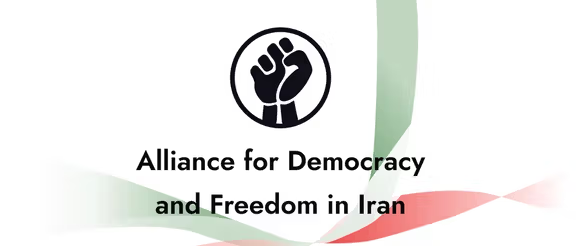
Prominent Iranian dissident figures, who have recently made an alliance against the Islamic Republic, has issued a Charter of Solidarity and Alliance for Freedom.
The group, which calls itself the Alliance for Democracy and Freedom in Iran, announced its existence in a February event at Georgetown University's Institute for Women, Peace and Security (GIWPS) -- titled ‘The Future of Iran’s Democracy Movement.'
Exiled Prince Reza Pahlavi, Nobel peace prize laureate Shirin Ebadi and Canada-based activist Hamed Esmaeilion, as well as US-based author, journalist and women’s rights activist Masih Alinejad, actress and activist Nazanin Boniadi and Secretary General of Komala Iranian Kurdish party Abdullah Mohtadi had said that they would release the charter that would lay the foundations for political representation of the aspirations of protesters in Iran and gain support for isolating the Islamic Republic.
The document is also called the Mahsa Charter in reference to “the murder of Mahsa (Jina) Amini and the beginning of the Woman, Life, Freedom revolution,” which has seen the people of Iran continuing to fight for freedom “to break the chains of injustice, discrimination and tyranny.”
Emphasizing that the way to building a free and democratic Iran is to overcome the Islamic Republic regime, they said, “Reaching this ultimate goal necessitates the three elements of unison, organization and relentless continuity in activism.”
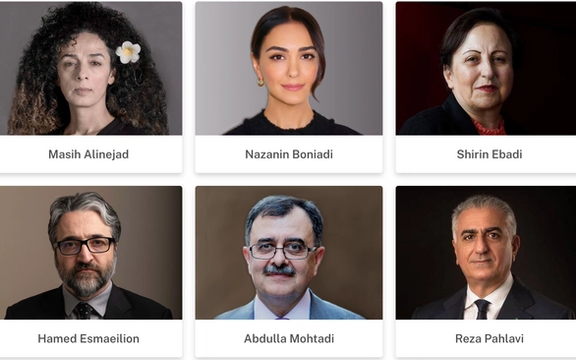
They said the charter relies initially on activities outside of the country, underlining that the isolation of the Islamic government internationally is a first and necessary step for a democratic change.
The charter calls for international pressure on the Islamic Republic to halt all death sentences and to immediately release all political prisoners without condition; expulsion of the regime’s ambassadors and all its dependents by democratic governments and acknowledging the alliance of opposition figures as well as their charter; and facilitating any means necessary to aid the people of Iran.
“Subsequent actions will take place with the participation of activists inside Iran to focus on fair transitional justice, the formation of a council for the transition of power, and the means by which power is transferred to a secular, democratic government,” reads the charter, adding that “The Alliance will introduce actionable initiatives using democratic methods to be implemented at the earliest opportunity in order to bring to fruition the civil action struggles of the people of Iran.”
The members of the alliance have repeatedly said that anyone who accepts the core values of the group is welcome to join them, but until now there had not been a clear explanation for their main values. They enumerated 17 common values for a democratic Iran, noting that the form of the future government will be a secular-democratic system determined through a referendum. “All political and official members of the state shall be elected through a free and democratic election process whereby citizens of all beliefs, ethnicities, gender and sexual orientation be afforded dignity and equal rights before the law.”
The need to maintain the territorial integrity of Iran while accepting diversity in language, ethnicity, religion and culture; and to decentralize power by deferring financial, bureaucratic and policy making affairs to elected provincial, city, and regional administrations is also among the values.
The charter also talks about the formation of an independent organization to supervise elections and the acceptance of domestic and international monitoring of elections, which would result in “a new national constitution through an inclusive and transparent process.” “The new constitution shall adhere to the Universal Declaration of Human Rights in its entirety.”
The charter also mentions the abolition of the death penalty and any corporal punishment and enacting the Convention on the Elimination of All Forms of Discrimination against Women as well as the establishment of an independent judicial system in accordance with international standards. It calls for Justice for all victims of the Islamic Republic through fact finding commissions under the auspices of fair and independent courts including the right to independent legal representation.
One of main points of the charter is the abolition of the Islamic Revolutionary Guards Corp – or the IRGC -- and all of its subsidiaries. “The possibility to integrate IRGC elements into other armed forces such as the army may only be possible in the absence of involvement in crimes and based on necessary qualifications,” it said, adding that “The military shall only be responsible to defend the territorial integrity of the country.”
It also called for “cooperation and peaceful relations with all countries in the world, and to cease all interference in the affairs of other countries, and to join the International Criminal Court.” Joining the International Convention on Nuclear Safety and the Financial Action Task Force (FATF) were key values in the charter.
“To overcome the Islamic Republic’s tyranny, all Iranians who are committed to freedom must unite. The courage of the people of Iran and their persistent fight for freedom shall be the bright beacon of hope for our future. Let us stand united in the creation of a free tomorrow," the charter concluded.
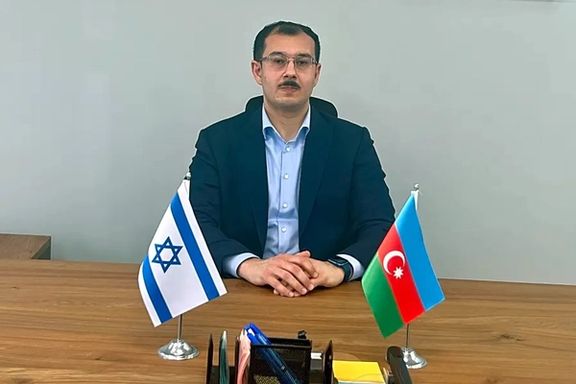
Azerbaijan's ambassador-designate to Israel Mukhtar Mammadov says his country would not let Israel’s military to use Azerbaijan as a base for a possible attack against Iran.
Denying previous reports about preparing an airfield to assist Israel during an attack on the Islamic Republic, Mammadov said in his first interview after arriving in Tel Aviv last week that Baku would not assist Israel in case it decides to attack Iranian nuclear facilities.
Mammadov also rejected reports that Azerbaijan would allow the Mossad to set up a branch in Azerbaijan to monitor what is happening in Iran.
“Azerbaijan, from the start, has declared that it will not interfere in the internal matters of other countries and will not allow its territory to be used against other countries,” the ambassador said. “This is because we expect other countries not to interfere in our internal matters.”
Iranian officials have been occasionally accusing Azerbaijan of allowing Israel to set up intelligence and military bases on its territory as an operational base against Iran.
The ambassador, who was set to present his credentials to President Isaac Herzog on Thursday, said “Every country is responsible for the protection and defense of their territorial integrity and the sovereignty of their citizens. Azerbaijan is no exception.”
His meeting was pushed off to a later undetermined date, as speculation has heightened over the possibility of an Israeli military attack against Iran, since the Islamic Republic appears close to producing weapons-grade uranium, according to The Jerusalem Post.
Azerbaijan and Israel have been increasingly public in their growing ties. While Israel has had an embassy in Azerbaijan since the 1990s, Azerbaijan formally appointed its first ambassador to the Jewish state in January.
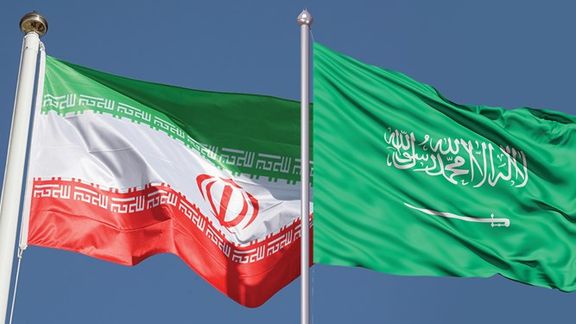
Regional countries and parties have welcomed an agreement in Beijing on Friday between Iran and Saudi Arabia to restore diplomatic relations.
A diplomatic advisor to the United Arab Emirates president said he welcomed the agreement.
"We welcome the agreement between Saudi Arabia and Iran to resume diplomatic relations, and we hail the Chinese role in this regard," Anwar Gargash tweeted.
"The UAE believes in the importance of positive communication and dialogue among the countries of the region towards consolidating the concepts of good neighborliness and starting from a common ground to build a more stable future for all."
Lebanon, a country in deep economic crisis and dominated by Iran-backed Hezbollah also welcomed the Saudi-Iranian agreement. Hezbollah leader Hassan Nasrallah in turn called it a “good development.”
Oman, which has good relations with both countries also welcomed the announcement, the foreign ministry said in a statement on Friday.
The chief negotiator of Yemen's Iran-backed Houthi movement said in a tweet on Friday that the region needs the resumption of "normal ties" between its countries, following the announcement the Riyadh-Tehran announcement.
"The region needs the resumption of normal ties between its countries for the Islamic nation to reclaim its lost security as a result of foreign interference," Mohammed Abdulsalam said.
Saudi Arabia kept Washington informed of its talks, but the United States was not directly involved, White House spokesman John Kirby said on Friday.
"The Saudis did keep us informed about these talks that they were having, just as we keep them informed on our engagements, but we weren't directly involved," Kirby told reporters.
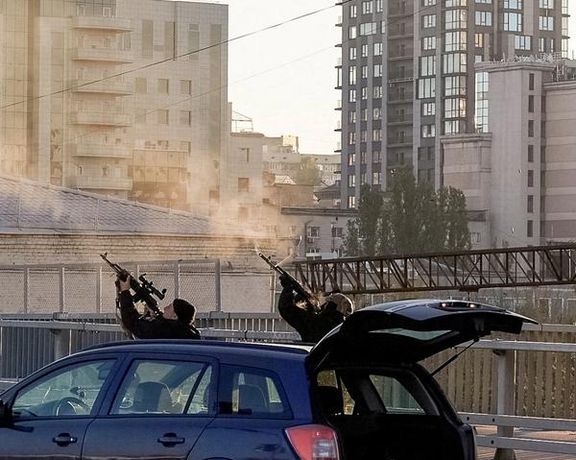
A new report has revealed that Russia is sending US and NATO weapons and equipment captured on the battlefield in Ukraine to Iran to be reverse-engineered.
In a report Friday, CNN cited four sources familiar with the matter as saying that Tehran has been trying to reverse-engineer the systems and probably produce similar ones.
According to the sources, US, NATO and other Western officials have seen several instances of Russian forces seizing smaller, shoulder-fired weapons equipment including Javelin anti-tank and Stinger anti-aircraft systems that Ukrainian forces have left behind on the battlefield.
In many cases, Russia has then flown the equipment to Iran to dismantle and analyze, likely so the Islamic Republic military can attempt to make their own version of the weapons, sources said, adding that Russia believes that continuing to provide captured Western weapons to Iran will incentivize Tehran to maintain its support for Russia’s war.
CNN report says US officials do not believe that the issue is widespread or systematic, and that it is not clear if Iran has successfully reverse-engineered any US weapons taken in Ukraine. The report added that since the beginning of the war the Ukrainian military has kept reporting to the Pentagon any losses of US-provided equipment to Russian forces.
Iran seems to be adept at developing weapons systems based on US equipment seized in the past. The Toophan anti-tank guided missile was reverse engineered from the American BGM-71 TOW missile, and the country also intercepted a US-made drone in 2011, a Lockheed Martin RQ-170 “Sentinel”, and reverse-engineered it to create a new drone.
The US is doing everything possible to counter the “burgeoning” military ties between Iran and Russia, the State Department said in February.

Iran and Saudi Arabia have agreed to re-establish diplomatic ties after Chinese-mediated talks in Beijing.
Over five days of negotiations, it was agreed that the two countries will reinstate embassies and missions after seven years of deadlock.
Saudi Arabia severed relations with the Islamic Republic in January 2016 after pro-government Iranian mobs attacked and ransacked its embassy in Tehran and consulate in Mashhad following the execution of a Saudi Shiite cleric.
Relations remained tense as Iran expanded its influence in Arab countries with substantial Shiite populations and built up its proxy forces opposed to Saudi Arabia and supporting Iran’s regional policies.
The most crucial bilateral tension was with Yemen, where Iran supported Houthi rebels against the remnants of the country’s legal government, supported by Saudi led forces. However, a truce has been holding since last year.
The Secretary of Iran’s Supreme National Security Council, Ali Shamkhani, ‘the representative of the Supreme Leader’, Saudi Arabia’s national security advisor Musaad bin Mohammed Al Aiban and China’s Wang Yi, Director of the office of the Central Foreign Affairs Commission of the Chinese Communist Party, all signed the deal.
China’s role in mediating the detente amid serious Western tensions with Iran signals the elevation of its status as a Middle East power player. Beijing has good relations both with Riyadh and Tehran and its success this week will irk other parties such as Qatar which has long tried to position itself as the region’s negotiator.
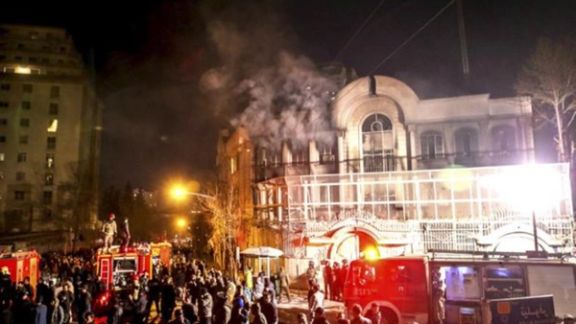
Reinstating relations with the most powerful Persian Gulf nation will be seen as a huge boost to Iran which is facing serious economic problems due to the lack of a nuclear agreement with the West and US sanctions weighing heavily over its finances. This has been exacerbated since the recent protests which began in September.
Meanwhile, the revived relationship does not alleviate Saudi’s concerns for the regime’s continued expansion of its nuclear capacity. Saudi Arabia and the United States have allegedly been in talks to build Saudi’s own civilian nuclear program as fears around Iranian actions grow and even the Persian Gulf's most powerful nation seeks greater security reassurances from its allies.
In spite of tense relations between the Biden administration and Crown Prince Mohammed Bin Salman, the de facto ruler, Saudi Arabia also wants fewer restrictions on US arms sales, according to the New York Times.
People close to the talks say the US is leveraging the request to force Saudi’s hand to normalize relations with Israel, furthering the Trump-negotiated Abraham Accords which saw the United Arab Emirates, Bahrain and Morocco sign up to diplomatic ties with the Jewish state. Sudan has since joined.
Saudi has long said that formal diplomatic relations with Israel depend on a peaceful resolution to the Israel-Palestine conflict, though the two have been conducting business and security cooperation behind closed doors for some time. Saudi also opened its air space to Israel, in the wake of the Accords, signed in 2020.
However, as revelations of Iran’s growing capabilities continue and the JCPOA talks look no more likely to be revived after their collapse last year, the Kingdom is seeking other options. It is no simple process.
The US has no desire to give Saudi nuclear capabilities - Biden having already stated a desire to make the Kingdom a “pariah state” following the execution of Saudi journalist Jamal Khashoggi in the Saudi embassy in Istanbul in 2018. In spite of a visit last year, relations between the two countries remain tense.
Such a deal would no doubt be greatly challenged in Congress where several Democrats have voiced a desire to downgrade not increase relations with Saudi Arabia, where dozens of executions continue each year, without trial, and human rights are still widely violated, according to rights groups.
Without the assurances of a body such as NATO, agreements to arm Saudi could be a huge risk and possibly the end of the Biden administration.
Senator Christopher S. Murphy, Democrat of Connecticut and a member of the Foreign Relations Committee and a vehement campaigner to limit US arms sales to Saudi, told the New York Times: “If we’re going to enter into a relationship with the Saudis where we’re doing more significant arms sales, it should be in exchange for better behavior toward the United States, not just better behavior toward Israel.”